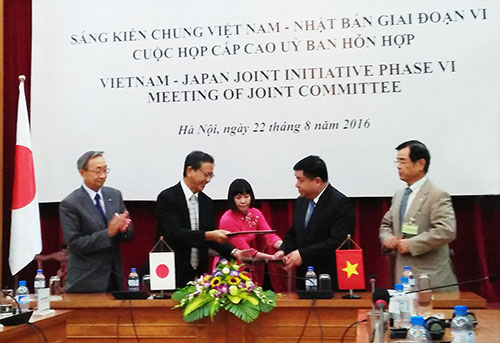Vietnam-Japan Joint Initiative to address foreign investors’ issues
 |
The Ministry of Planning and Investment (MPI), the Japanese Embassy in Vietnam, and the Vietnam-Japan Economic Committee on August 22 inked an agreement on deploying the sixth phase of the Vietnam-Japan Joint Initiative from now until late 2017.
The phase is particularly focused on seven sectors, including labour, wages, logistics-transport, services, support for small and medium-sized enterprises (SMEs), provisions of the Investment and Enterprise laws that hamper foreign investors, and pharmaceuticals distribution.
“Japanese firms are facing great difficulties in doing business due to issues in these seven areas,” said Minister of Planning and Investment Nguyen Chi Dung. “We hope the sixth phase will help resolve such difficulties and positively change Vietnam’s investment climate.”
According to YanaiTaiji, chairman of the Japan Business Association in Vietnam (JBAV), the Vietnamese business environment has been improved by a certain level, however, there are still many shortcomings in many fields, such as taxation, labour, and customs procedures.
For example, Article 106(2b) of the Code of Labour restricts overtime to no more than four hours a day, 30 hours per month, and 200 hours per year. Overtime can be extended to 300 hours per year in special cases stipulated by the government. If found in violation of this regulation, the employer will be subject to severe sanctions.
However, JBAV said this regulation is unsuitable and it is reasonable to allow employers to extend minimum overtime hours to a more reasonable level. Flexible timing can be applied so that each individual can decide their starting and finishing times to be able to balance work and life.
In another case, a document on the phase stated that the minimum wage at private firms in Vietnam is increasing, while the calculation methods remain “unclear.” Arguably, the pay rise is far higher than the rate of inflation and GDP growth.
Agreeing with this view, the Japan External Trade Organisation (JETRO) told the MPI that heaps of difficulties are affecting Japanese firms in Vietnam. Under JETRO’s latest survey on the Vietnamese business climate, over 50 per cent are facing a surge in labour costs.
Japanese firms have been investing in over 3,000 projects worth more than $40 billion in Vietnam so far.
What the stars mean:
★ Poor ★ ★ Promising ★★★ Good ★★★★ Very good ★★★★★ Exceptional
Latest News
More News
- Pegasus Tech Ventures steps up Vietnam focus (February 05, 2026 | 17:25)
- The generics industry: unlocking new growth drivers (February 04, 2026 | 17:39)
- Vietnam ready to increase purchases of US goods (February 04, 2026 | 15:55)
- Steel industry faces challenges in 2026 (February 03, 2026 | 17:20)
- State corporations poised to drive 2026 growth (February 03, 2026 | 13:58)
- Why high-tech talent will define Vietnam’s growth (February 02, 2026 | 10:47)
- FMCG resilience amid varying storms (February 02, 2026 | 10:00)
- Customs reforms strengthen business confidence, support trade growth (February 01, 2026 | 08:20)
- Vietnam and US to launch sixth trade negotiation round (January 30, 2026 | 15:19)
- Digital publishing emerges as key growth driver in Vietnam (January 30, 2026 | 10:59)















 Mobile Version
Mobile Version